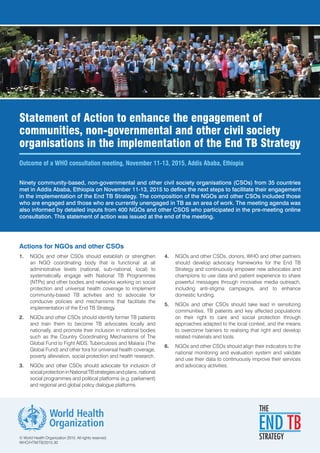
Strengthening Engagement of NGOs in TB Strategy Implementation
- 1. Statement of Action to enhance the engagement of communities, non-governmental and other civil society organisations in the implementation of the End TB Strategy Outcome of a WHO consultation meeting, November 11-13, 2015, Addis Ababa, Ethiopia Actions for NGOs and other CSOs 1. NGOs and other CSOs should establish or strengthen an NGO coordinating body that is functional at all administrative levels (national, sub-national, local) to systematically engage with National TB Programmes (NTPs) and other bodies and networks working on social protection and universal health coverage to implement community-based TB activities and to advocate for conducive policies and mechanisms that facilitate the implementation of the End TB Strategy. 2. NGOs and other CSOs should identify former TB patients and train them to become TB advocates locally and nationally, and promote their inclusion in national bodies such as the Country Coordinating Mechanisms of The Global Fund to Fight AIDS, Tuberculosis and Malaria (The Global Fund) and other fora for universal health coverage, poverty alleviation, social protection and health research. 3. NGOs and other CSOs should advocate for inclusion of socialprotectioninNationalTBstrategiesandplans,national social programmes and political platforms (e.g. parliament) and regional and global policy dialogue platforms. 4. NGOs and other CSOs, donors, WHO and other partners should develop advocacy frameworks for the End TB Strategy and continuously empower new advocates and champions to use data and patient experience to share powerful messages through innovative media outreach, including anti-stigma campaigns, and to enhance domestic funding. 5. NGOs and other CSOs should take lead in sensitizing communities, TB patients and key affected populations on their right to care and social protection through approaches adapted to the local context, and the means to overcome barriers to realising that right and develop related materials and tools. 6. NGOs and other CSOs should align their indicators to the national monitoring and evaluation system and validate and use their data to continuously improve their services and advocacy activities. Ninety community-based, non-governmental and other civil society organisations (CSOs) from 35 countries met in Addis Ababa, Ethiopia on November 11-13, 2015 to define the next steps to facilitate their engagement in the implementation of the End TB Strategy. The composition of the NGOs and other CSOs included those who are engaged and those who are currently unengaged in TB as an area of work. The meeting agenda was also informed by detailed inputs from 400 NGOs and other CSOS who participated in the pre-meeting online consultation. This statement of action was issued at the end of the meeting. © World Health Organization 2015. All rights reserved. WHO/HTM/TB/2015.30
- 2. Actions for National TB Programmes, Ministries of Health other line ministries 7. NTPs should define mechanisms, including focal points and regular meetings, to work together with NGOs and other CSOs to plan and implement community-based TB activities and engage with NGO coordinating bodies. 8. NTPs need to work closely with NGOs and other CSOs to develop standardised indicators, joint data validation mechanisms, joint supervision and training to strengthen a single national monitoring and evaluation system. NTPs and NGOs and other CSOs should also exchange programme review and supervision reports. 9. Ministries of Health and other related Ministries (e.g. Ministry of Social Affairs or their equivalent) should create a formal mechanism to promote and implement the social protection agenda, in collaboration with NGOs and other CSOs, WHO, The Global Fund and other partners, dependingonthecountrycontext.Thetermsofreferenceof the mechanism can include conducting situation analysis (e.g. mapping of existing social protection services, NGOs and other CSOs involvement, assessment and evaluation of current social protection efforts), building capacity, mobilising resources and engaging local organisations working on social protection and livelihood to TB. 10. Ministries of Health and other related Ministries (e.g. Ministry of Social Affairs or their equivalent) should actively involve NGOs and other CSOs working on TB for social protection related policy formulation, planning and implementation processes. Actions for The Global Fund and other bilateral and multilateral donors 11. The Global Fund and other donors should include specific budget lines as a requirement to support the engagement of NGOs and other CSOs in implementing community- based TB activities in their support to high TB burden countries. 12. BilateralandmultilateraldonorssupportingTBprogrammes should ensure that funds provided to national programmes include allocations for capacity building and technical assistance to NGOs and other CSOs. 13. Bilateral and multilateral donors to TB need to systematically require close collaboration between NTPs and NGOs and other CSOs in planning, implementation monitoring and evaluation as mandatory criteria for funding. Actions for WHO 14. WHO should facilitate interaction between the NTP and NGOs and other CSOs by supporting the establishment or strengthening of NGO coordinating bodies and build capacity of NTPs, NGOs and other CSOs through its country offices. 15. WHO should work with the NTPs to promote the wider adoption of the ENGAGE-TB approach to enhance the engagement of unengaged NGOs and other CSOs in TB activities. 16. WHO in consultation with NGOs and other CSOs should define a minimum and country-specific package of requirements including technical assistance needed for unengaged NGOs and other CSOs to become engaged in TB activities. 17. WHO should develop additional optional indicators targeting vulnerable populations (children, household contacts, key populations) and also indicators that measure the equity, impact and effectiveness of community-based TB activities. 18. WHO, in collaboration with The Global Fund and other relevant stakeholders, should produce guidance, ensure resources and monitor the inclusion of TB patients in effective social protection schemes. 19. WHO should promote the use of mobile and electronic tools and technologies for monitoring and evaluation of community-based activities by NTPs and NGOs and other CSOs. 20. WHO should advocate with NTPs, NGOs and other CSOs, donors and all other stakeholders to align their target setting, at the minimum, with the End TB targets. For further information: www.who.int/tb/areas-of-work/community-engagement/en/